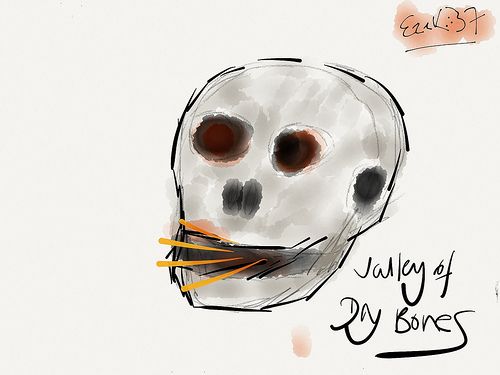Dry Bones
We step closer and closer toward Holy Week, and this week we read all about death and the hope of resurrection—first in Ezekiel’s trek into the valley full of dry bones, second into Bethany where Jesus brings his friend Lazarus back from the dead.
Ezekiel, or “Zeke,” is a prophet, of course, and God teleports him into a valley full of bones—maybe a battlefield. The bones are all dried up; there is no sign of life. God asks Zeke if he thinks that the bones can live again. Zeke says, “God knows.” With a nod of acknowledgement, God tells Zeke to prophesy to the bones. Now prophets often speak to people who don’t listen, but this is ridiculous!
Zeke tells the bones that they will have breath, flesh, muscle, etc. and they will live again and will know that God is God. And it happens just like that, except that they don’t breathe; the reanimated bodies just sort of lied there like department store manikins.
At God’s instruction, Zeke tells the Spirit now to come from every direction and make the manikins breathe. They do, but now they say, “We’re all dried up, we’ve no hope left, and we’re cut off from life.” So God tells Zeke to tell them that God will open up their graves and bring them back into Israel—they’ll have to know God’s reality then! Now God will put the spirit within them and they will really live.
Who is the main character in this imaginative story, God or Zeke?
If the main character is God, we might glean some information about our creator—that God wants God’s children to live, that God can do amazing things and is ultimately more powerful than death, and that God influences people to bring new life into our world (whatever “new life” really means).
If the main character is Zeke, we might focus our energy on what it is that we are to do in order to bring new life into the world. Are we to also prophesy to those who miss those who have died, who seem dead, or who actually are dead? Will we know when God tells us to do something, or is that direct/prophet connection to God limited to a select few like Zeke?
Or maybe the main character in this isn’t God or Zeke at all! Maybe the main character is the ruach (“breath,” “wind,” or “spirit”) of God. The ruach mentioned here is the same ruach God breathed into the first human in the garden, the same one that moves in the Lazarus story in John, the same one breathed into Jesus crucified to lift him to resurrection life, and the very same one that comes to us in baptism. This ruach is like Christopher Walken—it seems to be in everything!
Warning: Imagining Christopher Walken as the Holy Spirit may cause waking nightmares and could seriously damage you, spiritually.
If ruach is the main character of this story, what might we learn from its role?
Even as the bodies are reanimated, they lack hope and feel disconnected. Their home was destroyed, and they were murdered. Now outside of their land—a familiar place of communion with God and one another—they are fearful that God has abandoned them altogether. Yet God is very present with them—so present that God speaks directly to one who walks among them in the valley; a mouthpiece of the divine. But God is also present in ruach, and all they need to do is to breathe in God’s presence.
Thousands of years later we have piled up a lot of conceptions of the Holy Spirit—overused by some and underused by just as many. Focusing only on the sort of metaphorical image of God’s presence being as accessible to us as air is to breathe, consider how fear prevents us from living just as much as death does.
In life, that is; and this life is what we’re talking about here…right? Fear has perfected the art of preventing us from living, to the point that we can find ourselves somewhat paralyzed by fear—of the unknown future, of a broken relationship, of a major decision.
Fear paralyzes, but God promises and provides abundant life. The promise of that life is extended to the whole world through Jesus the Christ who gave his life in a manner that emphasized how nothing worldly can make God or God’s goodness any less real—not in the heights of the mountains, the depths of the valleys, nor in death or life—nothing separates us from the love of God.
John Donne, who we remember this week on our calendar of saints, wrote, “And at Thy death giving such liberal dole,/Moist with one drop of Thy blood my dry soul.”
The reality and brutality of Jesus’ sacrifice at death nourishes our dry souls in a way similar to when God revitalized the dry bones in Ezekiel’s midst. Can the dry bones of our churches, our governments, our society, our public discourse, our economies, our relationships, and our souls find renewed life? Can we find solidarity with those in despair, and can we be messengers of God’s goodness and advocates for those who could use some advocacy?
God only knows.
The Rev’d Curtis Farr is the assistant rector of St. James’s Episcopal Church. He blogs for St. James’s every Wednesday, offering reflections on the readings of scripture from the upcoming Sunday. His personal blog is entitled Bowing to Mystery, on which he posts sermons, articles, pictures, videos, etc.
This is a weekly contribution to the creative and imaginative process of interpreting the black and white fire of Scripture. Sometimes using an adapted process of Midrash, the author includes historical/cultural information, personal anecdotes, and other theologians’ ruminations on selected passages from the upcoming Sunday’s lectionary readings. All are welcome to journey into the fire by using the comment sections on the blog itself, or on Facebook or Tumblr.
Photo: James Poulter, 2012, Flickr

